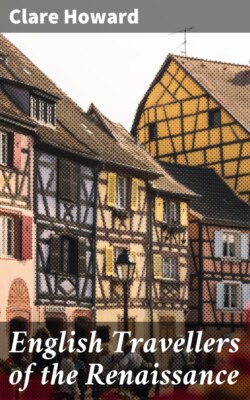English Travellers of the Renaissance

Реклама. ООО «ЛитРес», ИНН: 7719571260.
Оглавление
Clare Howard. English Travellers of the Renaissance
English Travellers of the Renaissance
Table of Contents
PREFACE
INTRODUCTION
CHAPTER I
THE BEGINNINGS OF TRAVEL FOR CULTURE
CHAPTER II
THE HIGH PURPOSE OF THE ELIZABETHAN TRAVELLER
CHAPTER III
SOME CYNICAL ASPERSIONS UPON THE BENEFITS OF TRAVEL
CHAPTER IV
PERILS FOR PROTESTANT TRAVELLERS
CHAPTER V
THE INFLUENCE OF THE FRENCH ACADEMIES
CHAPTER VI
THE GRAND TOUR
CHAPTER VII
THE DECADENCE OF THE GRAND TOUR
BIBLIOGRAPHY
I
CHRONOLOGICAL TABLE OF ADVICE TO TRAVELLERS, 1500–1700
II
TRAVELS, MEMOIRS, LETTERS AND BIOGRAPHIES, 1500–1700, USED IN THE FOREGOING CHAPTERS
III
CRITICAL OR OTHER WORKS WHICH HAVE BEEN USEFUL IN THIS STUDY
INDEX
FOOTNOTES
Отрывок из книги
Clare Howard
Published by Good Press, 2019
.....
There were other elements that contributed to the growth of travel besides the desire to become exquisitely learned. The ambition of Henry VIII. to be a power in European politics opened the liveliest intercourse with the Continent. It was soon found that a special combination of qualities was needed in the ambassadors to carry out his aspirations. Churchmen, like the ungrateful Pole, for whose education he had generously subscribed, were often unpliable to his views of the Pope; a good old English gentleman, though devoted, might be like Sir Robert Wingfield, simple, unsophisticated, and the laughingstock of foreigners.[24] A courtier, such as Lord Rochford, who could play tennis, make verses, and become "intime" at the court of Francis I., could not hold his own in disputes of papal authority with highly educated ecclesiastics.[25] Hence it came about that the choice of an ambassador fell more and more upon men of sound education who also knew something of foreign countries: such as Sir Thomas Wyatt, or Sir Richard Wingfield, of Cambridge and Gray's Inn, who had studied at Ferrara[26]; Sir Nicholas Wotton, who had lived in Perugia, and graduated doctor of civil and canon law[27]; or Anthony St. Lieger, who, according to Lloyd, "when twelve years of age was sent for his grammar learning with his tutor into France, for his carriage into Italy, for his philosophy to Cambridge, for his law to Gray's Inn: and for that which completed all, the government of himself, to court; where his debonairness and freedom took with the king, as his solidity and wisdom with the Cardinal."[28] Sometimes Henry was even at pains to pick out and send abroad promising university students with a view to training them especially for diplomacy. On one of his visits to Oxford he was impressed with the comely presence and flowing expression of John Mason, who, though the son of a cowherd, was notable at the university for his "polite and majestick speaking."
King Henry disposed of him in foreign parts, to add practical experience to his speculative studies, and paid for his education out of the king's Privy Purse, as we see by the royal expenses for September 1530. Among such items as "£8, 18s. to Hanybell Zinzano, for drinks and other medicines for the King's Horses"; and, "20s. to the fellow with the dancing dog," is the entry of "a year's exhibition to Mason, the King's scholar at Paris, £3, 6s. 8d."[29]
.....